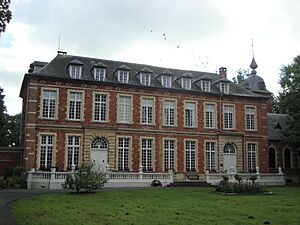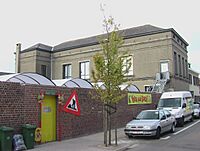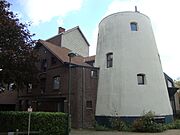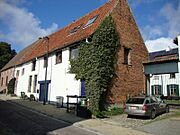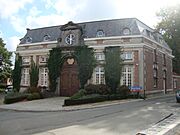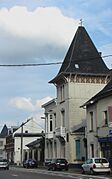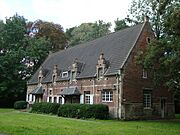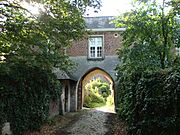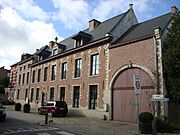Kortenberg facts for kids
Quick facts for kids
Kortenberg
|
|||
|---|---|---|---|
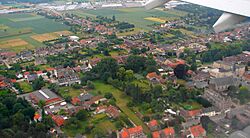
Erps-Kwerps
|
|||
|
|||
| Country | Belgium | ||
| Community | Flemish Community | ||
| Region | Flemish Region | ||
| Province | Flemish Brabant | ||
| Arrondissement | Leuven | ||
| Area | |||
| • Total | 34.52 km2 (13.33 sq mi) | ||
| Population
(2018-01-01)Lua error in Module:Wd at line 1575: attempt to index field 'wikibase' (a nil value).
|
|||
| • Total | Lua error in Module:Wd at line 1,575: attempt to index field 'wikibase' (a nil value). | ||
| Postal codes |
3070, 3071, 3078
|
||
| Area codes | 02, 016 | ||
| Website | www.kortenberg.be | ||
Kortenberg is a town in Belgium. It is a municipality located in the province of Flemish Brabant. You can find it about halfway between the big cities of Brussels and Leuven.
The municipality of Kortenberg includes several smaller towns. These are Erps-Kwerps, Everberg, Kortenberg itself, and Meerbeek. In 2013, Kortenberg had a total population of 19,393 people. The area covers about 34.52 square kilometers. This means there are about 562 people living in each square kilometer. There are also two small villages, called hamlets. Vrebos is in the southern part of Everberg. Schoonaarde is between Erps-Kwerps and Meerbeek, close to the Erps-Kwerps train station.
Contents
Kortenberg's Past
Ancient Discoveries
In the area of Erps-Kwerps, archaeologists have found remains of an old Roman villa. This was a large country house built during the time of the Roman Empire. They also found a burial ground from the Frankish people. The Franks were a group of Germanic tribes who lived in Europe a long time ago.
Founding of Kortenberg
Kortenberg was officially founded in 1095. In that year, a religious leader named Gualgericus, who was the Bishop of Cambrai, recognized a religious group living on a "short hill" (Curtenbergh). This is where the name Kortenberg comes from.
In 1222, the members of this religious community moved from the hill. They settled in a lower area called Minneveld. This is where the famous Abbey of Kortenberg still stands today.
Local Leaders and Growth
From early times, important families called the Lords of Cortenberg lived in the village. They played a big role in the history of the duchy of Brabant. The town of Erps, which used to be independent, was the main local government area in the region starting in 1286.
Kortenberg grew a lot when a paved road was built between 1706 and 1709. Later, in 1866, a railroad was built, which also helped the area develop. By the late 1800s, many new, fancy homes were built. These houses had a special style called Belle Epoque, often with unique spires on their roofs.
World War I Impact
On August 27, 1914, during World War I, German troops entered Kortenberg. They set fire to a local brewery, some homes, and a small castle.
Abbey of Kortenberg
A Benedictine abbey has been in Kortenberg since 1222. An abbey is a place where monks or nuns live and worship.
The Charter of Kortenberg
In 1312, a very important event happened at the abbey. John II, Duke of Brabant signed the Charter of Kortenberg there. This document was like a constitution for the entire Duchy of Brabant. It gave power to an early form of a democratic government. It is considered the second document in Western history, after the Magna Carta, to limit the power of rulers. It gave more rights and freedoms to ordinary people.
Abbey Buildings and Park
The Abbey of Kortenberg has a long and exciting history. It has been burned down, robbed, and rebuilt many times. The oldest parts that are still standing today include the gate building from the early 1600s. It has a gothic gate with a spire. Other old parts are the Cattle Courtyard from 1650 and the Brewery from 1732. The abbey castle was built between 1779 and 1783.
The main hall and the chapel were built in 1934. The abbey is now owned by the local church authority. In 2005, the Flemish government declared it a protected monument. Today, the Old Abbey Kortenberg is a place for quiet reflection. Its grounds are also open to the public as a park, where people can relax and enjoy nature.
Getting Around Kortenberg
Roads
The main highway that crosses Kortenberg is the A3/E40. This road connects Brussels to Liège. Even though the highway goes through Kortenberg, there are no direct exits or entrances in the municipality. The closest exits are Sterrebeek (exit 21) and Bertem (exit 22). The main local road is the N2, which links Brussels with Leuven.
Trains
Kortenberg has its own train station on the Brussels-Liège line (line 36). The town of Erps-Kwerps also has a train station on the same line. Both stations are served by the national rail company, SNCB.
Train services include:
- S2: This train goes from Braine-le-Comte to Leuven, passing through Brussels South station. It runs twice an hour most of the day. It also stops at Erps-Kwerps station.
- S9: This train goes from Nivelles to Landen, via Brussels Schuman station. It runs once an hour, only on weekdays.
Buses
The Flemish bus company De Lijn provides a network of public buses in Kortenberg.
Some of the bus services are:
- R90: Connects Brussels (North) to Kortenberg and Leuven.
- 91: Goes from Brussels Airport to Kortenberg, Everberg, and Leuven.
- R92: Connects Kraainem metro station to Kortenberg, Erps-Kwerps, and Leuven.
- Other lines serve local routes and school routes to nearby towns.
- There are also night buses (N3 and N4) that connect Kortenberg to Leuven and other areas.
Learning in Kortenberg
The municipality of Kortenberg runs primary schools in all four of its main towns:
- De Klimop in Erps-Kwerps
- De Negensprong in Everberg
- De Regenboog in Kortenberg
- De Boemerang in Meerbeek
The oldest school still operating in Kortenberg is Mater Dei in Erps-Kwerps. The Flemish Community also has its own primary school called Hertog-Jan. For secondary school, most students go to other nearby municipalities. These include Tervuren, Zaventem, Wezembeek-Oppem, Leuven, Haacht, and schools in the Brussels-Capital Region.
Famous People from Kortenberg
Many interesting people have lived in Kortenberg, or were born or died there.
- Marie Abts-Ermens: She is famous for sewing the very first Belgian flag.
- Félicien Marceau: A French novelist, whose real name was Louis Carette.
- de Mérode family: A very important noble family in Belgium.
- Albert Jozef de Vleeschauwer van Braekel: A well-known politician.
- Robert J. Houben: A Minister of State.
- Jean Meeus: A famous astronomer.
- General Bernard Montgomery: A British Army officer who visited Kortenberg in 1941 and 1944.
- Edward Schillebeeckx: A respected theologian (someone who studies religion).
- Karel Van Miert: A Minister of State and a European Commissioner.
Gallery
See also
 In Spanish: Kortenberg para niños
In Spanish: Kortenberg para niños
 | Charles R. Drew |
 | Benjamin Banneker |
 | Jane C. Wright |
 | Roger Arliner Young |




